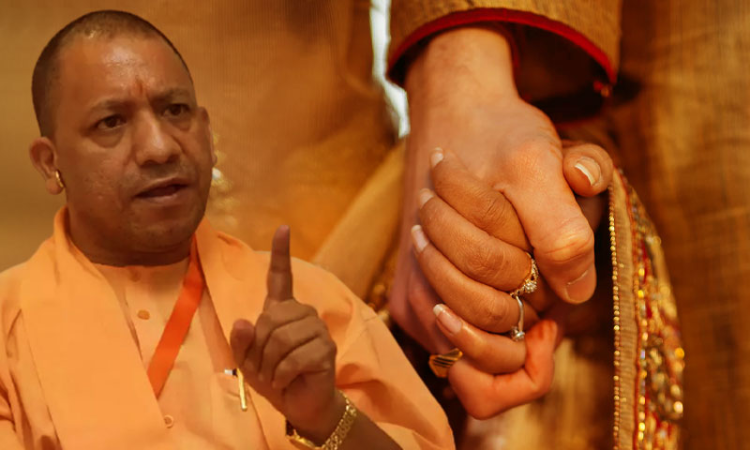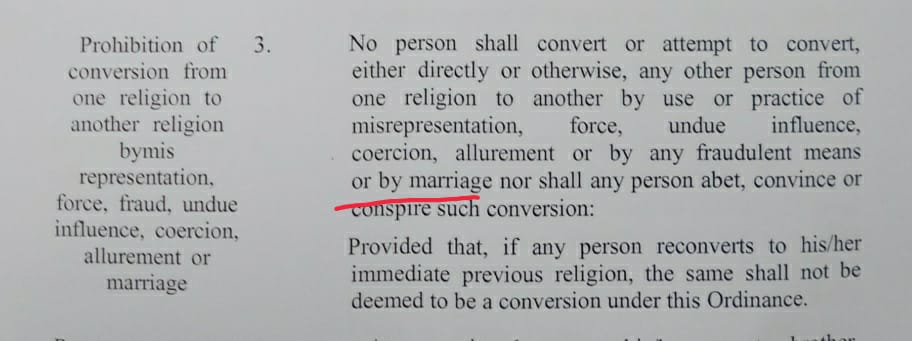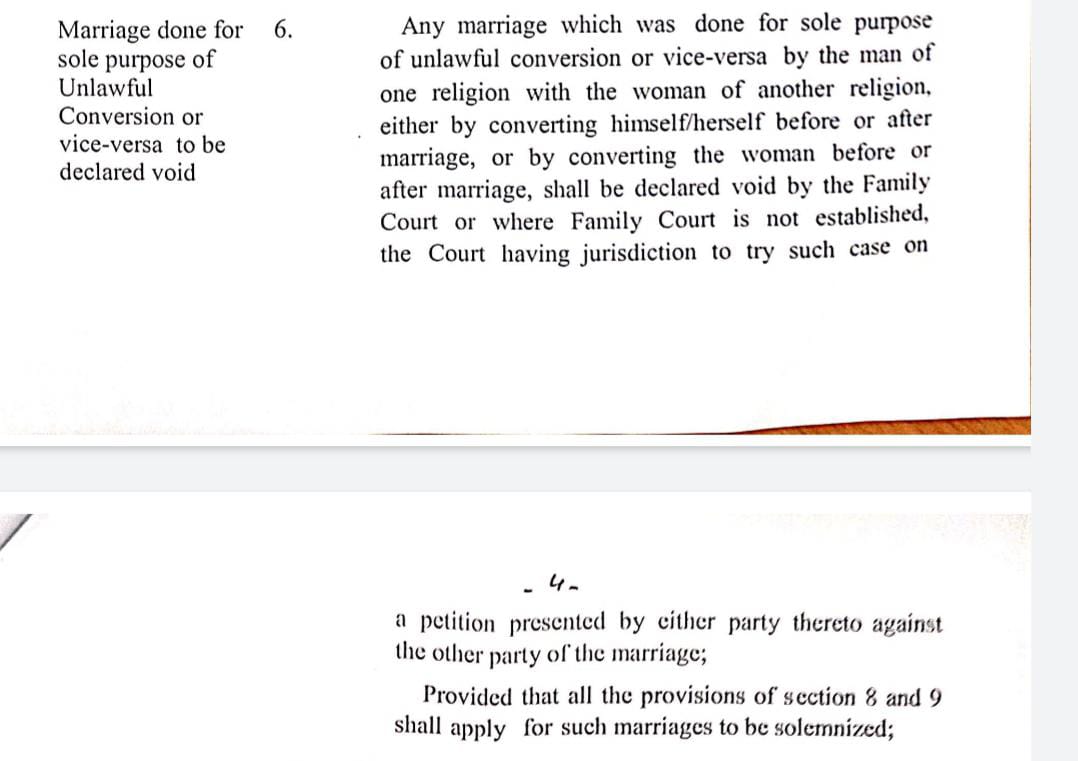UP Ordinance Criminalizing Religious Conversion By Marriage Is An Assault On Personal Liberty
Manu Sebastian
30 Nov 2020 12:04 PM IST

The Ordinance leads to an unreasonable intrusion into the domain of a personal autonomy and furthers communal stereotypes.
The Ordinance titled Uttar Pradesh Prohibition of Unlawful Conversion of Religion Ordinance, 2020 (Uttar Pradesh Vidhi Virudh Dharma Samparivartan Pratishedh Adhyadhesh, 2020) requires every religious conversion to be scrutinized and certified by the State.
The very concept of forcing an individual to explain and justify a decision, which is closely personal to her, before an officer of the State is contrary to Constitutionalism. The Constitution imposes limitations on State power and burdens the State to explain and justify the decisions taken by it affecting the rights and lives of citizens. The Ordinance inverses this equation.
There are many troublesome aspects in this Ordinance which treats every religious conversion as unlawful unless certified by the State. But the focus of the present article is on a deeply problematic provision of the Ordinance, which seeks to criminalize religious conversions done for the sake of marriage.
Section 3 of the Ordinance prohibits one person from converting the religion of another person by marriage. In another words, religious conversion by marriage is made unlawful. Violation of this provision is punishable with imprisonment for a term which is not less than one year but which may extend up to 5 years and a fine of minimum rupees fifteen thousand. If the person converted happens to be a woman, the punishment is double the normal term and fine.

The offence is congnizable and non-bailable. Section 4 enables any person related to the converted person by blood or marriage to lodge an FIR against the conversion. Section 6 empowers Courts to void any marriage it is done for the sole purpose of unlawful conversion or if unwlaful conversion is done for the sole purpose of marriage.

These provisions giving State policing powers over a citizen's choice of life-partner or religion militate against the fundamental rights to individual autonomy, privacy, human dignity and personal liberty guaranteed under Article 21 of the Constitution.
Few days before the promulgation of the Ordinance, the Allahabad High Court had pronounced a significant verdict stating that "Right to live with a person of his/her choice irrespective of religion professed by them, is intrinsic to right to life and personal liberty."
The division bench of the High Court declared as bad in law two single-bench precedents which had held that conversion just for the sake of marriage was invalid.
The division bench said that the single bench decisions failed to deal with the "the issue of life and liberty of two matured individuals in choosing a partner or their right to freedom of choice as to with whom they would like to live".
"...neither any individual nor a family nor even the state can have an objection to the relationship of two major individuals who out of their own free will are living together", the High Court stated.
The Ordinance assumes a 'tone-deaf' position to this latest ruling of the High Court, which is in line with the expansive meaning given to 'personal liberty' by the Supreme Court in its decisions in K S Puttaswamy(privacy case), Navtej Johar(decriminalization of Section 377IPC), Joseph Shine(decriminalization of adultery), Shefin Jahan(Hadiya) and Shakti Vahini(khap panchayat) cases.
In the Shefin Jahan case, the Supreme Court held that the right to change of faith is part of fundamental right of choice.
"The consent of the family or the community or the clan is not necessary once the two adult individuals agree to enter into a wedlock", observed the top court while issuing directions to curb khap panchayat interferences in marriages.
In the Puttaswamy judgment upholding right to privacy as a fundamental right, the SC said :
"Privacy includes at its core the preservation of personal intimacies, the sanctity of family life, marriage, procreation, the home and sexual orientation. Privacy also connotes a right to be left alone. Privacy safeguards individual autonomy and recognises the ability of the individual to control vital aspects of his or her life. Personal choices governing a way of life are intrinsic to privacy. Privacy protects heterogeneity and recognises the plurality and diversity of our culture"
The Ordinance leads to an unreasonable intrusion into the domain of a personal autonomy. The provisions mandate an advance notice of a 60 days to the District Magistrate before the intended conversion, which is to be followed by a police enquiry into the circumstances of conversion. The religious priest doing the conversion is also required to give such prior notification. After the conversion, the person has to appear before the District Magistrate for confirmation. The authority will notify the conversion and will invite public objections, before confirming the conversion. These provisions have the potential to give state sanction and administrative support to the societal hostilities which persons intending to have inter-faith marriages face. Numerous petitions filed in High Courts seeking police protection for inter-faith couples denote the level of community threat and social ostracism which they have to face. The provisions of the Ordinance energize the community groups and reinforce the social asymmetries to further dis-empower an individual.
In this connection, an observation made by the Supreme Court in the Joseph Shine case is significant.
"The right to privacy depends on the exercise of autonomy and agency by individuals. In situations where citizens are disabled from exercising these essential attributes, Courts must step in to ensure that dignity is realised in the fullest sense".
Need for the law?
The right to choose life partner is a facet of right to privacy, as held in the Puttaswamy judgment. In that judgment, the top court explained that an invasion of right to privacy by the State must meet a threefold requirement to pass the Constitutional muster :
- Legality, which postulates the existence of law.
- Need, defined in terms of legitimate social need.
- Proportionality, which ensures a rational nexus between the objects and the means adopted to achieve them.
While the passing of the ordinance could arguably satisfy the first condition of 'legality', the State action falters when it comes to the tests of 'need' and 'proportionality'.
Going by the public statements of the UP Chief Minister, the need for the law was to control the cases of 'love-jihad', a term used to discredit marriages between Muslim men and Hindu women as concerted efforts to cause conversion using the pretext of love. But is there any factual foundation for the public utterances about 'love-jihad?' Shortly before the passing of the Ordinance, a Special Investigation Team of Kanpur police had submitted a report ruling out organized conspiracy behind the cases of Hindu-Muslim marriages which were put under scanner. The Kanpur police said they have found no evidence of a conspiracy or an organized effort in the case of Hindu-Muslim romances. Even the National Investigation Agency could not unearth any conspiracy behind inter-faith marriages in the probe launched in the wake of Hadiya case. Recently, the Ministry of Home Affairs told the Parliament that no such case has been reported by any central agency. The National Commission of Women also said recently that it has no data on 'love jihad'.
So, the question here is what were the compelling circumstances which forced the State to bring this law using emergency executive powers when 'love jihad' remains a bogey stemming out of religious stereotypes without factual evidence?
Proportionality
The effect of the law will be to bring a shadow of criminality over every inter-faith marriages. The law empowers disgruntled family members to slap criminal cases on couples who got married defying their diktats. Since the Ordinance reverses the burden of proof by forcing the accused to prove innocence in trial, complaints could be prosecuted at the mere ipse dixit of the irate family members even without any evidence.
Thus, the law will lead to a grossly disproportionate result by terrorizing inter-faith couples and by deterring such marriages.
Some find the practice of converting religion just for the sake of marriage ethically objectionable. But the question here is whether it should be criminalized. The penal provisions of the Ordinance against conversions for marriage militate against the core concepts of criminal jurisprudence.
In the Navtej Singh Johar case where SC decriminalized homosexuality, Justice Chandrachud had discussed the jurisprudence of criminal law. The rational bedrock of criminal law was identified as "the harm principle" as propounded by J S Mill, which permits punitive action on a citizen only to prevent real and tangible harm to another. The harm principle restricts criminal law from penalising conduct merely on the basis of its perceived immorality or unacceptability when the same is not harmful.
In the Joseph Shine case, while decriminalizing adultery, the concurring judgment of Justice Indu Malhotra observed:
"The element of public censure, visiting the delinquent with penal consequences, and overriding individual rights, would be justified only when the society is directly impacted by such conduct. In fact, a much stronger justification is required were an offence is punishable with imprisonment.
The State must follow the minimalist approach in the criminalization of offences, keeping in view the respect for the autonomy of the individual to make his/her personal choices".
Analyzed in the light of these principles, the hastily made Ordinance without any compelling factual grounds to justify its need, fails the test of proportionality.
Facially neutral but communally sensitive
The Ordinance appears to be facially neutral as it does not specify any particular religious community. But a provision of law cannot be viewed as operating in isolation from its social, political and cultural context.
The Ordinance has to be understood in the light of the 'love jihad' remarks of the UP Chief Minister, though it does not use the term expressly.
The Ordinance is furthering unfounded conspiracy theories which 'other' the Muslim community. In a progressive society, an inter-faith union will be welcomed and celebrated.. According to a report, many such couples opt for conversion in order to escape the procedures of Special Marriage Act, which exposes them to their hostile family members. Many of them see conversion as a practical and convenient way to co-habit a couple, escaping the hostile processes under the Special Marriage Act. The Ordinance delegitimizes such unions and creates a chilling effect on individuals who are seeking to transcend barriers of social and religious divisions.
Commenting that the law was an antithesis of Constitutional values, lawyer and scholar Gautam Bhatia said :
"It is evident that the "love jihad" laws aim to harness social prejudice against inter-faith marriages, and weaponise social and community power in order to discourage – and even persecute – individuals who want to marry outside their faith. To this is added a dose of violent patriarchy, which is set up on the assumption that women are unable to exercise their choices as free individuals, but must be "protected" by the State".
Legal commentator Vakasha Sachdev, writing in 'The Quint', drew parallels between the 'love jihad' laws and the Nuremberg Laws in Nazi Germany against mixed marriages.
Undermining agency of woman
That the law is also founded upon patriarchal notions is clear from the fact that it imposes higher punishment for causing conversion of a woman. The Ordinance undermines the agency of women by viewing them as 'properties' needing protection from men of another community(note the use of words like 'playing with the honour of our sisters and daughter' by the CM).
In the Hadiya case, the Supreme Court had criticized the tendency to brand a woman as "weak and vulnerable, capable of being exploited in many ways" for going against the current of social approval.
The Supreme Court observed :
"In deciding whether Shafin Jahan is a fit person for Hadiya to marry, the High Court has entered into prohibited terrain. Our choices are respected because they are ours. Social approval for intimate personal decisions is not the basis for recognizing them. Indeed, the Constitution protects personal liberty from disapproving audiences.
The strength of our Constitution lies in its acceptance of the plurality and diversity of our culture. Intimacies of marriage, including the choices which individuals make on whether or not to marry and on whom to marry, lie outside the control of the state. Courts as upholders of constitutional freedoms must safeguard these freedoms".
"To consider a free citizen as the property of another is an anathema to the ideal of dignity", the Supreme Court had said in the Joseph Shine case.
The law, which seeks to preserve the power asymmetries in the existing social hierarchies negates the concept of transformative constitution by pressurizing an individual to surrender the fundamental right to personal liberty before the State-supported status quo. More dangerously, the law acts as a vehicle for a divisive agenda by fanning communal passions, and every citizen who swears by the Constitution ought to denounce it.


